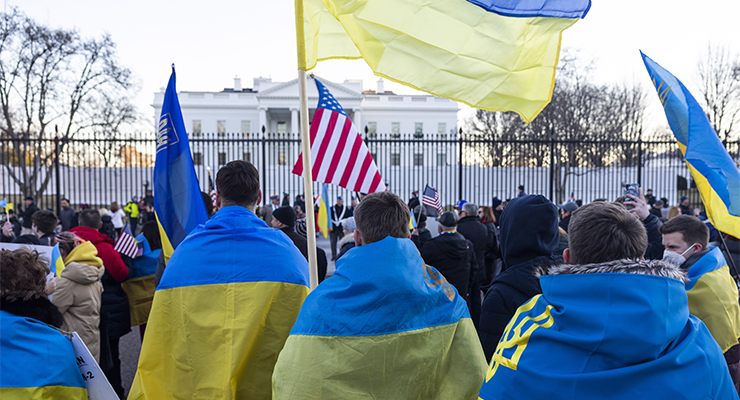
Politics stops at the water’s edge, or it may have in 1947, when then senator Arthur Vandenberg, chair of the Senate Foreign Relations Committee, first made the remark. But as partisan politics increasingly have bled into US foreign policy in recent years, next month’s midterm elections have raised concerns about how the election could impact US support for Ukraine as the war against Russia grinds into the winter.
Republicans have been widely predicted to retake control of the House of Representatives, and the future of the Senate remains up in the air. Although there has been strong bipartisan support for Kyiv since the war began among mainstream Republicans, former US president Donald Trump-aligned members as well as influential commentators on Fox News and other parts of the right-wing echo chamber have begun to question the degree of military aid provided by Washington.
The decision to further arm Ukraine maps onto a deepening rift within the Republican Party between hawkish establishment conservatives, not shy of overseas intervention, and a growing chorus of isolationists who gained prominence during the Trump administration.
“There are a lot of Republicans who are strongly behind Ukraine, who want the administration to do more,” said Democratic Representative Adam Smith, chair of the House Armed Services Committee.
There is, however, a creeping anxiety among Republicans, Democrats and Ukrainians as to whether they could be overwhelmed by the vocal minority. In May, 57 Republican members of the House and 11 Republican senators voted against a US$40 billion aid package for Ukraine while several members of the House Freedom Caucus, which represents some of the most extreme right-wing members, have spoken out explicitly against sending further aid to Ukraine. In August, members of the caucus cosponsored a bill that called for no more federal funds to be sent to Ukraine until a wall is erected along the US border with Mexico.
“These voices that believe in America First isolationism dominate all of the major right-wing media,” said Melinda Haring, deputy director of the Atlantic Council’s Eurasia Center. “They’re the noisiest and the loudest, and they get the most attention.”
Since the day Russia invaded Ukraine on February 24, highly influential Fox News anchors — such as Tucker Carlson — have portrayed the war as a failing of the Biden administration, an effort to avenge Russia’s interference in the 2016 presidential election. At times, Carlson has echoed Russian talking points about the war.
Other conservative commentators dismissed the impact that Carlson and others had on the broader Republican Party. “Anytime you’re citing Matt Gaetz and Tucker Carlson, it sounds like there is an agenda behind it,” said Danielle Pletka, a senior foreign policy and defence fellow at the American Enterprise Institute. Pletka noted that senior Republicans across the House and Senate have all encouraged the administration to provide more aid to Ukraine.
“I think a lot is overblown in terms of the effect of Fox News commentators,” said a Republican congressional aide who requested anonymity to discuss the matter. The aide noted that Republican concerns about military aid have largely centred on bureaucratic fights over appropriations and the urge to get heavy weaponry into the hands of the Ukrainian military faster. In a speech on the Senate floor in late September, minority leader Senator Mitch McConnell urged the Biden administration to move faster in delivering weapons to Ukraine
“The other hesitancy about providing money to Ukraine is not as much to do with Ukraine itself but the Biden administration not doing the proper oversight and accountability of very large sums of money being given to a foreign partner,” the aide added.
Others found little substance to the GOP’s critiques of the way the Biden administration has handled military aid to Ukraine. “Republican critiques of the Biden administration are nonsense on Ukraine. And I say that as a lifelong Republican and a Ukraine expert,” Haring said.
But views from the fringes of the party have proven capable of moving into the mainstream in recent years, as evidenced by the party’s coalescence around claims that the 2020 presidential election was fraudulent. A majority of GOP candidates running for office in November have questioned or rejected the outcome of the vote.
“That small group has certainly shown that they have a disproportionate influence on the direction that [House Minority leader Representative] Kevin McCarthy chooses,” Smith said.
Opinion polls already show creeping fatigue among Republican voters for US support for Ukraine, which could come to weigh on members. A Morning Consult poll released on Monday found only 32% of Republicans believe that the United States has a responsibility to protect and defend Ukraine from Russia, compared to 58% of Democrats. “I think it’s incumbent on mainstream Republicans to get out of Washington and New York and start talking to Americans,” Haring said. “We need to do better, and we need to explain why support for Ukraine is in the US national interest.”
Between January and October, Washington pledged US$26.8 billion in military aid, according to the Kiel Institute for the World Economy’s Ukraine Support Tracker, several times that of the second-biggest donor, the United Kingdom.
Any cutbacks to US military aid to Kyiv could deal an existential blow to Ukraine.
“People in Ukraine do believe that support for Ukraine is a bipartisan issue,” said Olena Tregub, secretary general of NAKO, an independent defence anti-corruption commission in Ukraine.
“Yet, of course, here in Ukraine, there is a strong reaction [to] some statements of Donald Trump or Tucker Carlson. These are really shocking statements for Ukrainians, and they are confused as to how Russian propaganda has penetrated the American Republican Party to such an extent,” she added.









Trump has a bromance or a situation of being blackmailed by Putin, either or leaves the Ukrainians in a precarious position if the Trumpist win the power in the house.
I note that as usual for western media, there is no context to the Ukraine war. It started from evil Russia and has gone downhill from there. No mention of Ukraine agression, NATO expansion. Again as I keep saying, read Prof Jeffrey Sachs or John Mearsheimer or Alfred de Zayas for a true reading of this totally unnecessary and tragic war.
Russia invaded Ukraine, they need to get out. Otherwise, the rump state that would be left would need constant economic support and be constantly at risk of Russia rebuilding its army and beginning the Imperialist project again. As some Russians are now saying Nato isn’t much of a threat especially compared to the ideology coming out of the Kremlin. A couple of strict realist ideologues making statements debunked by the left and right can’t change that.
Ukraine aggression? When did they invade a neighbouring country?
Listen to the Russian media and their government masters and you can only see this as an attempt to remake Russian Empire. Ukraine, Moldova Kazakhstan etc are hardly perfect but they have the right to self-determination.
Go read some popular front
Anglo dinosaurs in far away places bypassing evidence on the ground giving Putin a free pass, to aid whom? Sachs is Rockefeller Foundation linked and Mearsheimer is Koch linked; funny old world innit?
Sadly there are those amongst us who have not progressed beyond the old cartoon series of Black Hats and White Hats. The hate overwhelms any attempt of conciliation as resolution of conflict is not in the vocabulary. Win at all costs in the same manner as markets pit the competitors against each other.
Community is dead and self opinion reigns supreme.
https://johnmenadue.com/us-promoting-nuclear-war-anxiety-to-extend-scope-of-government/ is an interesting read.
Strangely conservatives respond to Unions with the same shock and horror.
What are you trying to express? You are writing in riddles…..
I rest my case.
How?
Yet another boost for the MIC.
Quoting the AEI is a bit blatant but wait, there’s more, not just free steak knives – The Atlantic Council!
In 2015 and 2016, the three largest donors, giving over $1 million USD each, were US millionaire Adrienne Arsht (executive vice chair), Lebanese billionaire Bahaa Hariri (estranged brother of Lebanese Prime Minister Saad Hariri), and the United Arab Emirates.The Ukrainian oligarch-run Burisma Holdings donated $100,000 per year for three years to the Atlantic Council starting in 2016. The full list of financial sponsors includes many military, financial, and corporate concerns.
The leading donors in 2018 were Facebook (whaa?)and the British government.
According to the Council, of its 2019 revenue, 14% (approximately $5.5 million) came from government donors excluding the US government.
In 2021, the founding donor was Adrienne Arsht, and donors giving more than $1 million were the American Securities Foundation, Bahaa Hariri, United Arab Emirates, Facebook, Goldman Sachs, The Rockefeller Foundation, and the UK Foreign, Commonwealth and Development Office.
https://twitter.com/ACEurasia?ref_src=twsrc%5Egoogle%7Ctwcamp%5Eserp%7Ctwgr%5Eauthor
Let’s slow down here, where is the evidence of the link between the AEI American Enterprise Institute and The Atlantic Council?
The latter is relatively long standing, global and related to diplomacy versus the former which is Koch Network supported think tank i.e. ‘radical right libertarian’ and described by Sourcewatch as:
‘an influential right-wing think tank that advocates for lower taxes, fewer protections for consumers and the environment, and cuts to the social safety net’.
Looks like the Saudi’s want Trump back, so they’ve cut oil production ahead of the mid-terms.
Does seem to be a symbiotic action, but one wonders how electorally advantageous it is for the GOP to be linked with Trump and the Saudis, now?
If there were any doubt that Trumpism is a Soviet destabilisation project…